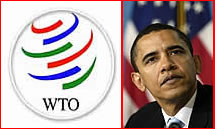Thursday, February 05, 2009


THE NUMBERS: Value of "fiscal stimulus" packages worldwide:
United States: $825 billion
China: $586 billion
Japan: $250 billion
Germany: $80 billion
Spain: $50 billion
France: $35 billion
United Kingdom: $30 billion
Canada: $45 billion
India: $20 billion
Australia: $20 billion
Korea: $11 billion
Brazil: $5 billion
Thailand: $3 billion
Singapore: $3 billion
Chile: $3 billion
WHAT THEY MEAN:
When businesses stop investing and families stop shopping, someone needs to do it for them. Thus the International Monetary Fund suggests governments launch an aggregate "fiscal stimulus" program of 2 percent of world GDP. In dollar terms this is about $1.2 trillion a year, or roughly half the total annual output of France. The hope is to (1) support growth, (2) create jobs, (3) pay for projects with lasting value, and (4) encourage international cooperation and coordination against the crisis. How are they responding? Counting is tricky, as some countries have two- and three-year stimulus programs, while others are overstating their totals by including spending they already planned. But that said, the United States plans a two-year stimulus of $800 billion to $900 billion, depending on the result of Congress’ arguments over it this month, and foreign stimulus packages in aggregate are now well above $1 trillion and rising. In total, they appear to be approaching the IMF’s hope.
Their ability to meet all the goals, though, depends on good policy and coordination as much as on total spending. The most effective approach is for all to do stimulus programs, and all to allow one another to bid on projects. Then there will be no free riders, all countries will be able to build the most projects for the money, and all will be engaged in a cooperative effort to preserve jobs and boost growth. Some legal requirements for this already exist: America is one of 12 participants in the WTO’s "Government Procurement Agreement," under which each participant allows companies from the other 11 to bid on government contracts. (The others are Canada, the European Union, Hong Kong, Iceland, Israel, Japan, Korea, Liechtenstein, Aruba, Singapore, and Switzerland. Free- trade arrangements with non-participants such as Mexico, Australia, and Chile provide reciprocal procurement-bid rights with a few more countries.) These countries are considering stimulus packages whose aggregate final value will probably exceed America’s. Assuming GPA members do not violate their commitments — even before considering the stimulus bills underway in China, India, and other developing countries — the agreement ensures that American businesses can bid not only on the U.S.’ $800 billion stimulus, but on the U.S. program plus another $800 billion or more in European, Japanese, Australian, Mexican, Chilean, Korean, Singapore, Hong Kong, and Israeli packages.
But this week’s Congressional debate on a proposal known as a "Buy American" rule shows that it might not work out. It requires that all iron and steel used in stimulus projects — or, in a more ambitious alternative formulation, all manufactured goods — come from American factories, unless doing so raises a project’s cost by 25 percent or more. (An existing permanent "Buy American" rule favors American providers as long as they charge no more than 6 percent more for materials than a foreign competitor, or 12 percent in the case of small business.) At home, with total spending remaining the same, the rule’s effect would be to make each project somewhat more expensive, reduce the total number of projects, and shift money toward metals businesses but away from labor-intensive businesses like building contractors, housing construction, transport, communications, and food-service. Abroad (as President Obama observed yesterday), it could easily make stimulus programs flash-points for disputes and mutually destructive actions instead of vehicles for cooperation.
To bar foreign businesses from American contracts is at minimum to invite them to exclude America from their stimulus packages. This in turn would mean (a) that American manufacturers, now bidding on the $800 U.S. package alone rather than the (roughly) $2.3 trillion world package, find their modest extra domestic business canceled out by many lost contracts abroad, (b) the world ends up with less effective stimulus packages and fewer projects of lasting value; and (c) a new problem, in the form of mutually destructive trade conflicts, may easily join those problems which already exist. Perhaps most important, with the economic events of 2009 so hard to predict but so likely to require cooperation and common effort, would be the erosion of the intangible habit of solidarity in the face of crisis. Altogether, a rather high price.
The Progressive Policy Institute is a research and education institute that is a project of the Third Way Foundation Inc., a nonprofit corporation based in the United States.
